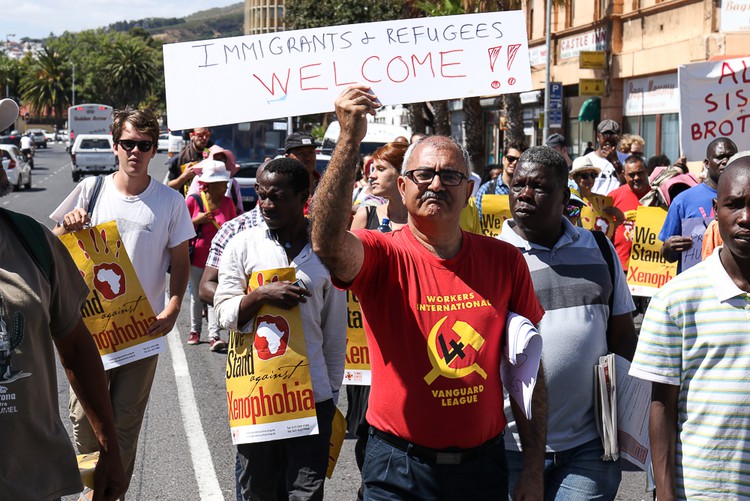Cape Town organisations protest against xenophobia and “scapegoating”
About 100 march to Parliament
On Saturday, a coalition of local and immigrant communities and organisations marched to Parliament to deliver a memorandum calling on government to stop inciting xenophobia and the “scapegoating” of African foreign nationals residing in South Africa.
Just over 100 people joined the march through the city centre, carrying placards that read: “We stand united against xenophobia” and “Refugees and immigrants need to be protected”.
The march follows the latest wave of attacks on African migrants and refugees in Rosettenville and Pretoria West over the past two weeks, which have resulted in scores of foreign-owned shops and properties being burnt and looted.
In 2015, at least six foreign nationals were killed in widespread xenophobic violence in Durban and Johannesburg. In 2008, at least 62 foreign nationals were killed in the worst bout of xenophobic violence that South Africa has seen.
On Saturday, Shaheed Mahomed, Secretary of the Workers International Vanguard Party and one of the coordinators of the march, told GroundUp that the march aimed to create a sense of unity and solidarity between African immigrants and working class South Africans.
“Each time a leader is facing a political crisis or is becoming unpopular, they make statements intended to make us fight against each other. We are saying no, that it is not going to happen. We are trying to form joint committees and we are saying let’s protect each other, let’s take up our common issues.”
Among the Cape Town-based activist groups who joined the march were Sonke Gender Justice, The Housing Assembly and United Family.
Saint Expedit, a trainer at Sonke Gender Justice, said that leadership had played a “key role in dividing communities, so we thought it was important to extend our support to this march, because as an organisation, we condemn any form of violence, including xenophobia.”
At Parliament, the memorandum was accepted by Charles Ford, a Presidency official, who said that President Jacob Zuma would respond within four to six weeks.
Support independent journalism
Donate using Payfast

Don't miss out on the latest news
We respect your privacy, and promise we won't spam you.
Next: No one must be left behind, says Blikkiesdorp committee
Previous: Sign declaration or face eviction, says college management
© 2017 GroundUp. 
This article is licensed under a Creative Commons Attribution-NoDerivatives 4.0 International License.
You may republish this article, so long as you credit the authors and GroundUp, and do not change the text. Please include a link back to the original article.

